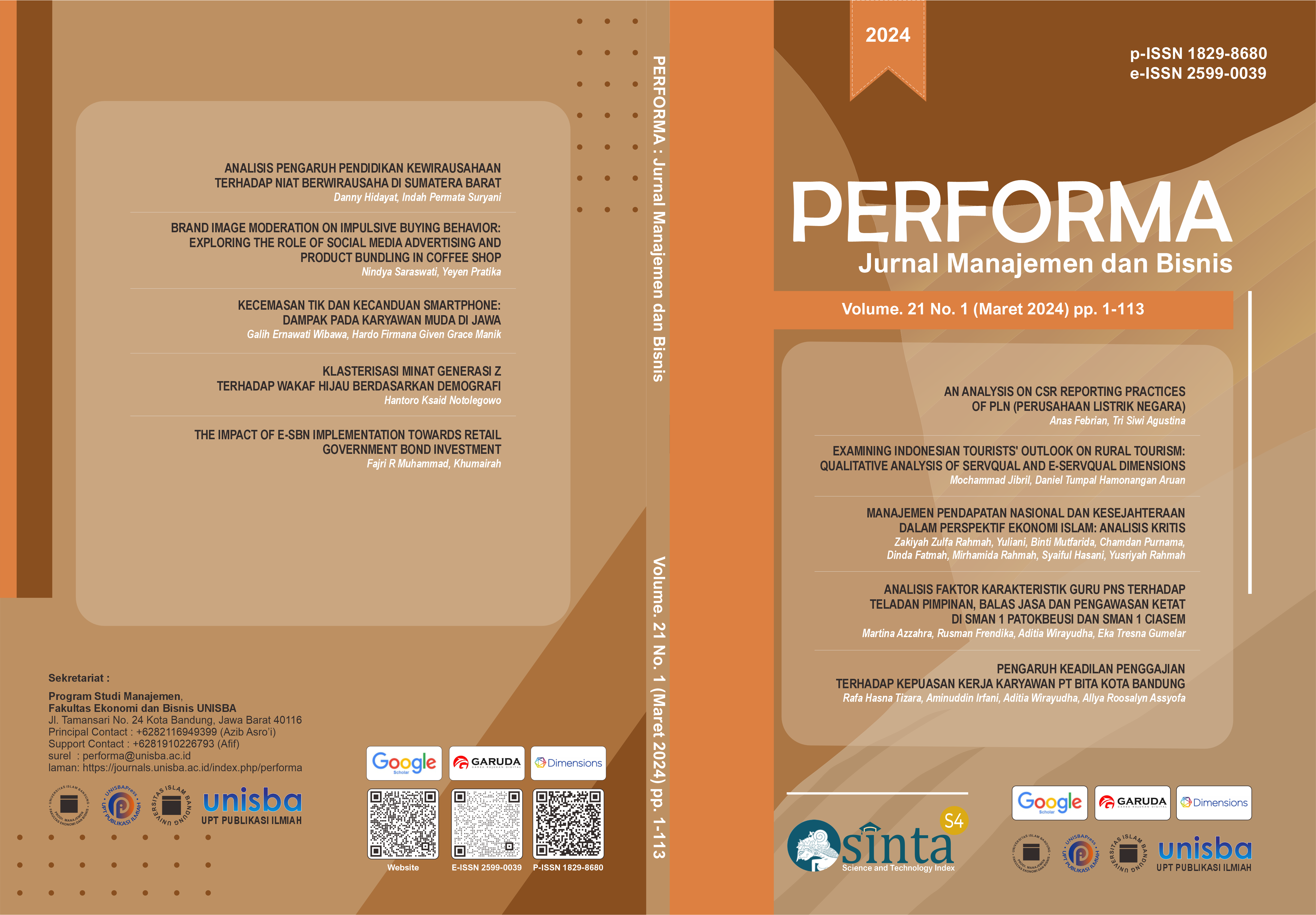ANALISIS PENGARUH PENDIDIKAN KEWIRAUSAHAAN TERHADAP NIAT BERWIRAUSAHA DI SUMATERA BARAT
DOI:
https://doi.org/10.29313/performa.v21i1.4088Keywords:
Pendidikan Formal Kewirausahaan, Pendidikan Informal Kewirausahaan, Pendidikan Non-Formal Kewirausahaan, Niat BerwirausahaAbstract
Pendidikan merupakan salah satu faktor yang mungkin dapat meningkatkan keinginan seseorang untuk memulai usaha sendiri. Untuk menganalisis dampak pendidikan kewirausahaan formal, informal, dan nonformal terhadap niat berwirausaha di Sumatera Barat, maka dilakukan penelitian ini. Sebanyak 200 responden yang merupakan pelajar atau calon pemilik perusahaan pada lembaga pendidikan formal, informal, dan nonformal dengan konsentrasi bisnis dan kewirausahaan mengisi kuesioner yang digunakan untuk mengumpulkan data penelitian. Pendidikan formal bagi wirausaha (X1), Pendidikan informal bagi wirausaha (X2), dan Pendidikan nonformal bagi wirausaha (X3) merupakan variabel independen dalam penelitian ini, sedangkan niat berwirausaha (Y1) merupakan variabel dependen. Penelitian ini menggunakan desain penelitian kuantitatif dengan menggunakan sampel penelitian yaitu mahasiswa atau calon pemilik usaha di Sumatera Barat. Perangkat lunak Smart PLS 4.0 digunakan dalam proses analisis data. Temuan penelitian menunjukkan bahwa tiga jenis pendidikan kewirausahaan mempunyai pengaruh positif dan signifikan terhadap niat berwirausaha: pendidikan kewirausahaan nonformal, pendidikan kewirausahaan informal, dan pendidikan kewirausahaan formal.
References
Adam, Aamir, M., (2014). External factors and entrepreneurial career intentions; moderating role of personality traits. International Journal of Academic Research, 3 (5), Part II.
Ajzen, Icek. (1991). The theory of planned behavior. Organizational Behavior and Human Decision Processes, 50, 179-211
Bauer, Theresa. 2014. The Respinsibilities of sosial Networking Companies: Applying Political CSR Theory to Google, Facebook and Twitter. Communicating Corporate Social Responsibility: Perspective and practice, Vol. 6, p. 259-282.
Epoh ( 2011) Enterpreneur Education and career Intentions Of tertiary Education Students in Akwa Ibom and River state, negeria
Fitriati, R. (2012). Entrepreneurship Education: Toward Models In Several Indonesia‟s University. Prosiding The 4th International Conference On Indonesian Studies: Unity, Diversity And Future, 68
Gerba, D.T. (2012). Impact of entrepreneurship education on entreprreneurial intentions of business and engineering students in Ethiopia. African Journal of Economic and Management Studies, 3 (2), 258-277.
Ghozali, I., & Latan, H. (2015). Partial Least Squares : Konsep, Teknik dan Aplikasi Menggunakan Program SmartPLS 3.0. Badan Penerbit Universitas Diponegoro.
Hair, J. F., Black, W. C., Babin, B. J., & Anderson, R. E. (2014). Multivariate Data Analysis: A Global Perspective (7th ed.). Pearson Education.
Kemdiknas.Go.Id/Web/Pages/Urgensi.Html, Diakses 2 September 2016).Undang-Undang Ri No 20 Tahun 2003, Sistem Pendidikan Nasional
Kuttim M, Kallaste, M., Venesaar, U., & Kiis, A. (2014). Entrepreneurship Education At University Level And Students ‟ Entrepreneurial Intentions, 110, 658–668. Https://Doi.Org/10.1016/J.Sbspro.2013.12.910
Kuratko, & Hornsby D.F. (2004). Sustaining Corporate Entrepreneurship: A Proposed Model of Perceived Implementation/Outcome Comparison at the Organizational and Individual Level. International Journal of Entrepreneurship and Innovation, 5(2): 77- 89.
Lorz M (2011). The Impact Of Entrepreneurship Education On Entrepreneurial Intention, (3966).
Mohammad, N., Lim H., Yusof, N., dan Soon, J. (2015). Estimating the effect of entrepreneur education on graduates intention to be entrepreneurs. Education + Training, 57 (8/9), 874-890.
Nurhayatul Husna (2015) Evaluasi Pelaksanaan Program Pelatihan Kerja Unit teknis Dinas Balai Latiah kerja ( UPTD BLK) Payakumbuh” Tesis Progam Studi Magister Perencanaan Pembangunan Progaram Magister dan Doktor Falkultas Ekonomi Universitas Andalas
Robinson, S., & Stubberud, H.A. (2014). Incorporating the triple bottom line in an entrepreneurship summer camp. Journal of Entrepreneurship Education, 17 (1), 13- 37.
Sekaran, Uma. 2007. Research Methods For Business, Salemba Empat. Jakarta
Turker, D., & Selcuk, S.S. (2009). Which factors affect entrepreneurial intention of university students? Journal of European Industrial Training, 33 (2), 142-159.
Van Gerderen, M., Brand, M., Van Praag, M., Bodewes, W., Poutsma, E., Van Gils, A., … Selcuk, S. S. (2009). Which Factors Affect Entrepreneurial Intention Of University Students? Journal Of European Industrial Training Journal Of Small Business And Enterprise Development Iss Career Development International Iss International Journal Of Entrepreneurial Behaviour &Amp; Research, 33(1), 142–159. Https://Doi.Org/10.1108/03090590910939049
Yang, J. (2013). The theory of planned behavior and prediction of entrepreneurial Intention among chinese undergraduates. Social Behavior and Personality. 41(3), 367-376.
yurkoru E S., Kuscub, Z.K. & Doganayc, A. (2014). Exploring the antecedents of entrepreneurial intention on Turkish university student. Social and Behavioral Science. 150.
Downloads
Published
How to Cite
Issue
Section
License
Copyright (c) 2024 Danny Hidayat, Indah Permata Suryani

This work is licensed under a Creative Commons Attribution-ShareAlike 4.0 International License.










